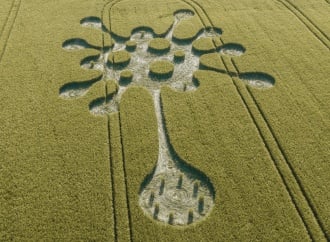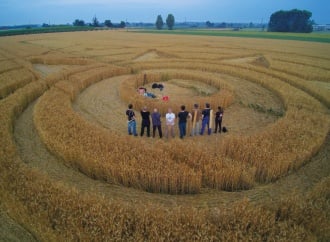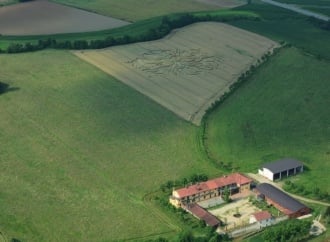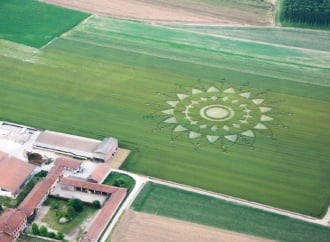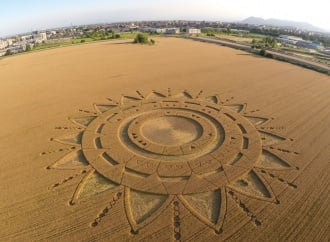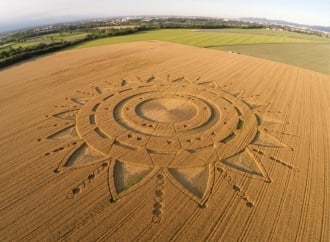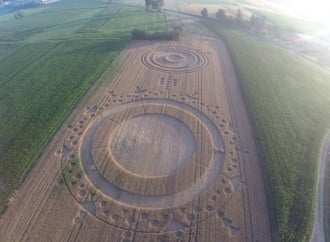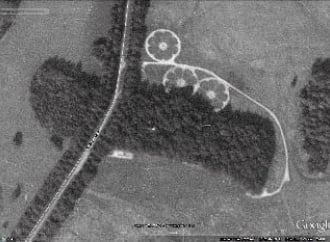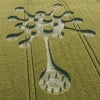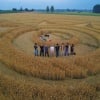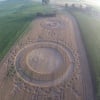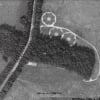Indice |
I crop circles, un fenomeno recente
Contrariamente ad altri fenomeni di interesse del CICAP, quello dei crop circles ha una storia molto breve: poco più di venti anni.
La loro presenza è stata storicamente notata e documentata sostanzialmente a partire dal 1980. I crop circles sono aumentati progressivamente di numero (da qualche unità nel 1980 a centinaia solo dieci anni dopo) e hanno cominciato a presentarsi in forme sempre più complesse dal punto di vista geometrico.
Come mai il fenomeno nasce così recentemente e nelle cronache antiche o nel folklore non se ne trova traccia?
Gli esperti a questa obiezione rispondono che esiste almeno un riferimento ai crop circles risalente al 1678. Nell'agosto di quell'anno, nella contea dell'Hertfordshire, in Inghilterra, fu pubblicato un pamphlet nel quale si racconta la storia del "Diavolo mietitore".
Il fenomeno sembra così avere le sue radici storiche e ben documentate, ed è proprio questo mistero che indagheremo in questo articolo.
1678: Il Pamphlet del "Diavolo Mietitore"
[...] in Inghilterra venne pubblicato un pamphlet contenente informazioni su una traccia circolare apparsa in un campo di avena. Il fatto venne attribuito all'opera del diavolo che "… faceva cerchi e piegava tutti gli steli in un modo tale che ogni mortale impiegherebbe più di un secolo per fare ciò che lui fece in una notte". [...]
Questo è quanto riporta Eltjo H. Haselhoff in un articolo (su internet al link: http://www.edicolaweb.net/ss000717.htm ) intitolato "CROP CIRCLES: LA SCIENZA RISPONDE".
Cercando informazioni su questo caso del 1678 si riesce facilmente a reperire, sempre su internet, la famosa immagine del "Mowing Devil" e il testo che introduce il contenuto del pamphlet stesso:
THE MOWING-DEVIL: OR, STRANGE NEWS OUT OF HARTFORD-SHIRE
Being a True Relation of a Farmer, who Bargaining with a Poor Mower, about the Cutting down Three Half Acres of Oats: upon the Mower's asking too much, the Farmer swore That the Devil should Mow it rather than He. And so it fell out, that very Night, the Crop of Oat shew'd as if it had been all of a Flame: but next Morning appear'd so neatly mow'd by the Devil or some Infernal Spirit, that no Mortal Man was able to do the like.
Also, How the said Oats ly now in the Field, and the Owner has not Power to fetch them away.
Licensed, August 22th, 1678
Being a True Relation of a Farmer, who Bargaining with a Poor Mower, about the Cutting down Three Half Acres of Oats: upon the Mower's asking too much, the Farmer swore That the Devil should Mow it rather than He. And so it fell out, that very Night, the Crop of Oat shew'd as if it had been all of a Flame: but next Morning appear'd so neatly mow'd by the Devil or some Infernal Spirit, that no Mortal Man was able to do the like.
Also, How the said Oats ly now in the Field, and the Owner has not Power to fetch them away.
Licensed, August 22th, 1678
Per comodità del lettore, cercheremo di tradurre il più possibile fedelmente in italiano:
IL DIAVOLO MIETITORE: OVVERO, STRANE NOVITA' NELL'HARTFORD-SHIRE
Questo è il racconto di un agricoltore che trattando con un povero mietitore sul compenso per la falciatura di tre mezzi acri di avena, a fronte di una richiesta troppo elevata del mietitore, giurò che il diavolo avrebbe mietuto il campo piuttosto che lui. E così accadde che quella stessa notte il campo di avena si mostrò come se fosse stato tutto una fiamma; ma il mattino seguente il campo apparve così perfettamente mietuto dal diavolo o da qualche spirito infernale, che nessun uomo (mortale) sarebbe stato in grado di fare la stessa cosa nella stessa maniera.
(Questo è) Inoltre (il racconto di), come l'avena giace ora sul campo, ed il proprietario non è in grado (non ha la forza) di portarla via.
Autorizzato il 22 Agosto 1678
Questo è il racconto di un agricoltore che trattando con un povero mietitore sul compenso per la falciatura di tre mezzi acri di avena, a fronte di una richiesta troppo elevata del mietitore, giurò che il diavolo avrebbe mietuto il campo piuttosto che lui. E così accadde che quella stessa notte il campo di avena si mostrò come se fosse stato tutto una fiamma; ma il mattino seguente il campo apparve così perfettamente mietuto dal diavolo o da qualche spirito infernale, che nessun uomo (mortale) sarebbe stato in grado di fare la stessa cosa nella stessa maniera.
(Questo è) Inoltre (il racconto di), come l'avena giace ora sul campo, ed il proprietario non è in grado (non ha la forza) di portarla via.
Autorizzato il 22 Agosto 1678
Abbiamo quindi tutti gli elementi del mistero per tentare un'indagine su questo caso storico che testimonierebbe in maniera inequivocabile la formazione di un crop circle nel 1678.
L'indagine ha inizio
Prima di spendere inutilmente energie, ci siamo interrogati sulla veridicità del documento, cioè se per qualche motivo il pamphlet potesse essere stato prodotto in anni recenti e poi spacciato come documento d'epoca. Seguendo questa pista non si arriva da nessuna parte, il pamphlet sembra essere un vero documento del 1678 e non ci sono fonti che ne smentiscano la storicità.
Allo stesso tempo però appaiono altri elementi che non sono così palesi ad una prima ricerca superficiale. E' possibile ad esempio ritrovare il lungo e completo testo del pamphlet (disponibile su questa pagina al termine dell'articolo).
Si scopre quindi che, nonostante la diffusione della sola introduzione e dell'immagine del diavolo, in realtà il pamphlet è costituito da un testo molto lungo in inglese arcaico.
Una versione completa del testo è reperibile ad esempio sul libro: Circles From The Sky (Edited by Terence Meaden).
Leggendolo nella sua interezza, è possibile cercare di darne un'interpretazione diversa? Che cosa è in realtà un pamphlet?
Che cosa è un pamphlet
Vari dizionari italiani descrivono il pamphlet come un "breve scritto di contenuto violentemente polemico o satirico", tuttavia in inglese è possibile cogliere un uso corrente del termine abbastanza distante dalle definizioni proposte in italiano. In sostanza il termine pamphlet è spesso usato (in inglese) per definire "un piccolo libro" oppure un "libro sottile", cioè in pratica la breve trattazione di uno specifico soggetto. Ad oggi i pamphlet non esistono più solo in formato cartaceo, ma è anche possibile imbattersi su internet in "Electronic pamphlets" o "e-pamphlets".
La parola pamphlet, così come la conosciamo oggi, fu usata per la prima volta nel quattordicesimo secolo per distinguere una "breve pubblicazione" da un "libro", e la sua etimologia si fa risalire al poema erotico latino "Pamphilus, seu de Amore" (Pamphilus, ovvero sull'Amore) pubblicato fra il 1100 e il 1200. La parola "Pamphilus" mutò successivamente in "Pamphilet" e quindi in "pamphlet". Lo scopo principale era quello di divulgare informazioni su argomenti specifici di natura polemica e propagandistica. La popolarità dei pamphlet crebbe notevolmente dopo l'invenzione della stampa e così cominciarono a circolare per l'Europa soprattutto nei secoli 1500 e 1600 in Inghilterra, Francia e Germania dove ebbero più o meno lo stesso scopo dei nostri attuali quotidiani.
In Inghilterra, intorno al 1660 periodo della "Restoration", avevano ormai lasciato il posto ai quotidiani e ai periodici, ma ritornarono ad essere molto importanti come "armi politiche" fino ad arrivare alla "Glorious Revolution" del 1688, anno che vede anche la nascita della storica "Dichiarazione dei Diritti" (Declaration of Rights).
Il Povero contro il Ricco
Leggendo il testo completo del "Diavolo Mietitore" e riprendendo le considerazioni storiche sull'uso dei pamphlet, è facile notare come il testo sia fortemente connotato con termini che caratterizzano due stereotipi di classi sociali: il povero e il ricco.
Al mietitore ci si riferisce sempre con il termine "Poor" (povero), all'agricoltore invece il testo fa riferimento come "Rich" (ricco).
Alla luce di queste considerazioni possiamo quindi dare al pamphlet una chiave di lettura diversa: potremmo essere di fronte ad una forma di comunicazione intimidatoria che vede contrapposti il povero e il ricco (il "Poor Mower" e il "Rich Farmer").
La citazione e la raffigurazione del diavolo sarebbe quindi una sorta di rappresentazione iconografica di un atto (vandalico/intimidatorio) che lascia trapelare l'idea che il diavolo (il sovrannaturale) starebbe dalla parte del povero, o meglio che il diavolo potrebbe danneggiare il ricco a riprova del fatto che esiste "realmente" una giustizia divina.
Traduzione alla lettera o interpretazione?
La storia del "Diavolo Mietitore" presenta, se vista come pura cronaca, dei forti punti di contatto con il fenomeno dei crop circles e degli UFO: le fiamme descritte potrebbero essere legate alla descrizione di un fenomeno UFO nel 1678, mentre i cerchi perfetti sarebbero la descrizione della formazione di un crop circle.
Ma è proprio vero che una traduzione alla lettera del pamphlet va in favore della tesi "UFO - crop circles"?
Focalizziamoci su un breve frammento del testo:
[...] that same night this poor Mower and Farmer parted, his Field of Oats was publickly beheld by several Passengers to be all of a Flame, and so continued for some space, to the great consternation of those that beheld it. [...]
Traduzione in italiano:
[...] quella stessa notte che il povero mietitore e l'agricoltore si separarono, il campo di avena fu pubblicamente visto (osservato) da numerosi passeggeri (testimoni) essere tutto una fiamma, e così continuò, con grande costernazione dei testimoni. [...]
Oppure riprendendo la fine del pamphlet:
[...] But not to keep the curious Reader any longer in suspense, the inquisitive Farmer no sooner arriv'd at the place where his Oats grew, but to his admiration he found the Crop was cut down ready to his hands; and [as] if the Devil had a mind to shew his dexterity in the art of Husbandry, and scorn'd to mow them after the usual manner, he cut them in round circles, and plac't every straw with that exactness that it would have taken up above an Age for any Man to perform what he did that one night: And the man that owns them is as yet afraid to remove them. FINIS
Traduzione in italiano:
[...] Per non tenere in "suspense" ancora a lungo il lettore curioso, il coltivatore (con fare) interrogativo (inquisitive) non fece in tempo ad arrivare sul posto in cui la sua avena era cresciuta, che con grande ammirazione trovò che il raccolto era stato tagliato (giù) già pronto per le sue mani; e come se il diavolo desiderasse mostrare la sua destrezza nell'arte dell'agricoltura e disprezzasse il fatto di falciare in modo usuale, tagliò (them = gli steli di avena) in cerchi rotondi e piazzò ogni paglia con una precisione tale che per qualunque uomo ci sarebbe voluto più di un'era per fare quello che (egli = il Diavolo) fece in quella notte: E il proprietario è ancora impaurito nel rimuoverli. FINE
Se vogliamo far fede ad una traduzione alla lettera, dobbiamo quindi dedurre che molti testimoni videro il campo in fiamme e non, come segnalato da varie fonti, delle "fiamme in cielo"!
Inoltre si parla chiaramente di avena recisa (falciata, tagliata). Il verbo "to cut" vuol dire "tagliare" o "recidere", non ci sono altre interpretazioni; "to flatten" (appiattire) è una cosa, "to cut" è un'altra!
D'altra parte il titolo del pamphlet è "Il Diavolo Mietitore" e non "Il Diavolo Appiattitore"!
Quanti altri crop circles moderni presentano queste due caratteristiche riportate nel pamphlet?
Alla luce di tutte queste considerazioni è interessante riprendere quanto riportato precedentemente da Haselhoff, in cui possiamo notare che lo studioso si è premurato di precisare che il diavolo "...piegava tutti gli steli..." ma il pamphlet dice qualcosa di assolutamente diverso!
Per non basarci solo su una fonte di informazione reperita via internet, riprendiamo quanto Haselhoff scrive invece a pagina 15 e 16 nel suo ultimo libro "La Natura Complessa dei Cerchi nel Grano (Ricerche Scientifiche & Leggende Urbane)":
[...] A quel tempo, il fenomeno venne considerato come l'opera del demonio che "disdegnando di mietere in modo tradizionale, aveva falciato le piante in precisi cerchi sistemando ogni stelo con tale precisione che per un uomo ci sarebbe voluta tutta la vita per fare il lavoro che era stato portato a termine in una sola notte".
Come illustrato dalla stampa corrispondente, sembra comunque che il raccolto fosse stato soltanto appiattito a terra piuttosto che falciato (Figura 1-1). Si vede in essa una piccola creatura dalle fattezza demoniache che sembra piegare a terra molti steli di grano, sistemandoli con estrema precisione. Il perfetto allineamento a spirale del raccolto appiattito a terra e l'evidente forma circolare sono davvero sorprendenti. Chiunque abbia visto un crop circle dal vivo non avrà dubbi che l'artista che ha disegnato il "Diavolo Mietitore" volesse rappresentare lo stesso fenomeno che si verifica oggi nei nostri campi. [...]
In questa versione possiamo notare altri dettagli. Haselhoff facendo appello all'uso dell'immagine piuttosto che al testo del pamphlet, fa riferimento a:
[...] una piccola creatura dalle fattezza demoniache che sembra piegare a terra molti steli di grano, [...]
In realtà la figura del diavolo ha proprio in mano una falce, e che azione potrebbe fare qualcuno con una falce in mano se non "falciare" piuttosto che "piegare"?
E poi ancora:
[...] Il perfetto allineamento a spirale del raccolto appiattito a terra e l'evidente forma circolare sono davvero sorprendenti.
Lasciamo al lettore trarre le sue conclusioni invitandolo a riguardare l'illustrazione ad inizio articolo, e limitandoci a segnalare che rifarsi ad una immagine di quel tipo per trarre delle conclusioni così "straordinarie" (fuori dall'ordinario) soffre di parecchi limiti.
Appare quindi evidente che anche Haselhoff, nel riportare la storia del "Diavolo Mietitore", si sia imbattuto nell'incongruenza logica messa in evidenza precedentemente, cioè "avena recisa" contro "avena piegata", ma tutte queste "forzature" evidenziate, possono essere casuali?
Conclusioni
A conclusione di questa indagine, ci sentiamo quindi di fare nostre le parole del Dr Owen Davies, professore di Storia alla "University of Hertfordshire" (http://www.herts.ac.uk/ ) che interpellato dall'autore dell'articolo, risponde così:
Caro Francesco,
ci sono due edizioni del pamphlet del "Mowing Devil", ma solamente uno contiene la famosa incisione (woodcut) dei cerchi. Sebbene possa capire perché gli entusiasti dei crop circles siano eccitati da questo caso, essi devono tener presente alcuni punti importanti:
1) I cerchi non sono appiattiti come tutti i moderni crop circles, ma sono il risultato della mietitura. E' un'importante distinzione da fare.
2) Il pamphlet è semplicemente un "racconto a sfondo morale" ad uso e consumo popolare. Ci sono altri numerosi pamphlet di "avvertimento/intimidazione" di quel periodo (benché non riguardanti "diavoli mietitori"). Non è riportata la località e nessuno riporta nomi.
3) Nel pamphlet è fornita una spiegazione perfettamente "ragionevole" sul perché il diavolo decise di mietere in cerchio: per mostrare le sue straordinarie abilità. Chiunque tenti di mietere un cerchio preciso con una falce conosce quanto sia difficile.
Il "motivo" circolare può anche essere messo in relazione al fatto che le riunioni di demoni e diavoli si svolgevano, in base ai princìpi magici, all'interno di un cerchio.
Spero che questo sia d'aiuto
Cordiali Saluti,
Owen
ci sono due edizioni del pamphlet del "Mowing Devil", ma solamente uno contiene la famosa incisione (woodcut) dei cerchi. Sebbene possa capire perché gli entusiasti dei crop circles siano eccitati da questo caso, essi devono tener presente alcuni punti importanti:
1) I cerchi non sono appiattiti come tutti i moderni crop circles, ma sono il risultato della mietitura. E' un'importante distinzione da fare.
2) Il pamphlet è semplicemente un "racconto a sfondo morale" ad uso e consumo popolare. Ci sono altri numerosi pamphlet di "avvertimento/intimidazione" di quel periodo (benché non riguardanti "diavoli mietitori"). Non è riportata la località e nessuno riporta nomi.
3) Nel pamphlet è fornita una spiegazione perfettamente "ragionevole" sul perché il diavolo decise di mietere in cerchio: per mostrare le sue straordinarie abilità. Chiunque tenti di mietere un cerchio preciso con una falce conosce quanto sia difficile.
Il "motivo" circolare può anche essere messo in relazione al fatto che le riunioni di demoni e diavoli si svolgevano, in base ai princìpi magici, all'interno di un cerchio.
Spero che questo sia d'aiuto
Cordiali Saluti,
Owen
FINIS
Riferimenti Bibliografici
- Grandi misteri della storia, Polidoro, Piemme (http://www.edizpiemme.it )
- Circles From The Sky (Edited by Terence Meaden)
- La Natura Complessa dei Cerchi nel Grano, Eltjo H. Haselhoff, Natrix
- L'enigma delle tracce circolari, Pat Delgado & Colin Andrews, Armenia/Milano '91
- Round in Circles, Jim Schnabel (http://www.skeptic.de/b/0245.htm )
Riferimenti Internet
- http://www.skeptic.de/b/0245.htm
- http://www.edicolaweb.net/ss000717.htm
- http://www.sis.buffalo.edu/.../pamphlets/Pamphlets.html
- http://www.lawsch.uga.edu/~glorious/
- http://www.herts.ac.uk/
- http://www.herts.ac.uk/.../ODavies.htm
- http://www.cicap.org/lombardia
- http://www.francescograssi.com
Testo completo del pamphlet
THE MOWING-DEVIL:
OR, STRANGE NEWS OUT OF HARTFORD-SHIRE
Being a True Relation of a Farmer, who Bargaining with a Poor Mower, about the Cutting down Three Half Acres of Oats: upon the Mower's asking too much, the Farmer swore That the Devil should Mow it rather than He. And so it fell out, that very Night, the Crop of Oat shew'd as if it had been all of a Flame: but next Morning appear'd so neatly mow'd by the Devil or some Infernal Spirit, that no Mortal Man was able to do the like.
Also, How the said Oats ly now in the Field, and the Owner has not Power to fetch them away.
Licensed, August 22, 1678
Men may dally with Heaven, and criticize on Hell, as Wittily as they please, but that there are really such places, the wise Dispensations of Almighty Providence does not cease continually to evince. For if by those accumulated circumstances which generally induce us to the belief of anything beyond our senses, we may reasonably gather that there are certainly such things as DEVILS, we must necessarily conclude that these Devils have a Hell: and as there is a Hell, there must be a Heaven, and consequently a GOD: and so all the Duties of Christian Religion as indispensable subsequents necessarily follow.
The first of which Propositions, this ensuing Narrative does not a little help to Confirm.
For no longer ago, than within the compass of the present Month of August, there hapned so unusual an Accident in Hartfordshire as is not only the general Discourse, and admiration of the whole County: but may for its Rarity challenge any other event, which has for these many years been Product in any other County whatsoever. The story thus.
In the said County lives a Rich industrious Farmer, who perceiving a small Crop of his (of about three Half-Acres of Land which he had sowed with Oats) to be Ripe and fit for Gathering, sent to a poor Neighbour whom he knew worked commonly in the Summer-time at Harvest Labour to agree with him about Mowing or Cutting the said Oats down. The poor man as it behoov'd Him endeavour'd to sell the Sweat of his Brows and Marrow of his Bones at as dear a Rate as reasonably he might, and therefore askt a good round Price
for his Labour, which the Farmer taking some exception at, bid him much more under the usual Rate than the poor Man askt for it: So that some sharp Words had past, when the Farmer told him he would Discourse with him no more about it.
Whereupon the honest Mower recollecting with himself, that if he undertook not that little Spot of Work, he might thereby lose much more business which the Farmer had to imploy him in beside, ran after him, and told him, that, rather than displease him, he would do it at what rate in Reason he pleas'd: and as an instance of his willingness to serve him, proposed to him a lower price, than he had Mowed for any time this Year before. The irretated Farmer with a stern look, and hasty gesture, told the poor man That the Devil himself should Mow his Oats before he should have anything to do with them, and upon this went his way, and left the sorrowful Yeoman, not a little troubled that he had disoblig'd one in whose Power it lay to do him many kindnesses.
But, however, in the happy series of an interrupted prosperity, we may strut and plume our selves over the miserable Indingencies of our necessitated Neighbours, yet there is a just God above, who weighs us not by our Bags, nor measures us by our Coffers: but l ooks upon all men indifferently, as the common sons of Adam: so that he who carefully Officiates that rank or Station wherein the Almighty has plac't him, tho' but a mean one, is truly more worthy the Estimation of all men, then he who is prefer'd to superior dignities, and abuses them: And what greater abuse than the contempt of Men below him: the relief of whose common necessities is none of the least Conditions whereby he holds all his Good things: which when that Tenure is forfeited by his default, he may justly expect some Judgement to ensue: or else that those riches whereby he prides himself so extravagantly may shortly be taken from him.
We will not attempt to fathom the cause, or reason of, Preternatural events: but certain we are, as the most Credible and General Relation can inform us, that same night this poor Mower and Farmer parted, his Field of Oats was publickly beheld by several Passengers to be all of a Flame, and so continued for some space, to the great consternation of those that beheld it.
Which strange news being by several carried to the Farmer next morning, could not but give him a great curiosity to go and see what was become of his Crop of Oats, which he could not imagine, but what was totally devour'd by those ravenous Flames which were observed to be so long resident on his Acre and a half of Ground.
Certainly a reflection on his sudden and indiscreet expression (That the Devil should Mowe his Oats before the poor Man should have anything to do with them) could not but on this occasion come into his Memory. For if we will but allow our selves so much leisure, to consider how many hits of providence go to the production of one Crop of Corn, such as the aptitude of the Soyl, the Seasonableness of Showers, Nourishing Sol-stices and Salubreous Winds, etc., we should rather welcome Maturity with Devout Acknowledgements than prevent our gathering of it by profuse wishes.
But not to keep the curious Reader any longer in suspense, the inquisitive Farmer no sooner arriv'd at the place where his Oats grew, but to his admiration he found the Crop was cut down ready to his hands; and [as] if the Devil had a mind to shew his dexterity in the art of Husbandry, and scorn'd to mow them after the usual manner, he cut them in round circles, and plac't every straw with that exactness that it would have taken up above an Age for any Man to perform what he did that one night: And the man that owns them is as yet afraid to remove them.
FINIS
OR, STRANGE NEWS OUT OF HARTFORD-SHIRE
Being a True Relation of a Farmer, who Bargaining with a Poor Mower, about the Cutting down Three Half Acres of Oats: upon the Mower's asking too much, the Farmer swore That the Devil should Mow it rather than He. And so it fell out, that very Night, the Crop of Oat shew'd as if it had been all of a Flame: but next Morning appear'd so neatly mow'd by the Devil or some Infernal Spirit, that no Mortal Man was able to do the like.
Also, How the said Oats ly now in the Field, and the Owner has not Power to fetch them away.
Licensed, August 22, 1678
Men may dally with Heaven, and criticize on Hell, as Wittily as they please, but that there are really such places, the wise Dispensations of Almighty Providence does not cease continually to evince. For if by those accumulated circumstances which generally induce us to the belief of anything beyond our senses, we may reasonably gather that there are certainly such things as DEVILS, we must necessarily conclude that these Devils have a Hell: and as there is a Hell, there must be a Heaven, and consequently a GOD: and so all the Duties of Christian Religion as indispensable subsequents necessarily follow.
The first of which Propositions, this ensuing Narrative does not a little help to Confirm.
For no longer ago, than within the compass of the present Month of August, there hapned so unusual an Accident in Hartfordshire as is not only the general Discourse, and admiration of the whole County: but may for its Rarity challenge any other event, which has for these many years been Product in any other County whatsoever. The story thus.
In the said County lives a Rich industrious Farmer, who perceiving a small Crop of his (of about three Half-Acres of Land which he had sowed with Oats) to be Ripe and fit for Gathering, sent to a poor Neighbour whom he knew worked commonly in the Summer-time at Harvest Labour to agree with him about Mowing or Cutting the said Oats down. The poor man as it behoov'd Him endeavour'd to sell the Sweat of his Brows and Marrow of his Bones at as dear a Rate as reasonably he might, and therefore askt a good round Price
for his Labour, which the Farmer taking some exception at, bid him much more under the usual Rate than the poor Man askt for it: So that some sharp Words had past, when the Farmer told him he would Discourse with him no more about it.
Whereupon the honest Mower recollecting with himself, that if he undertook not that little Spot of Work, he might thereby lose much more business which the Farmer had to imploy him in beside, ran after him, and told him, that, rather than displease him, he would do it at what rate in Reason he pleas'd: and as an instance of his willingness to serve him, proposed to him a lower price, than he had Mowed for any time this Year before. The irretated Farmer with a stern look, and hasty gesture, told the poor man That the Devil himself should Mow his Oats before he should have anything to do with them, and upon this went his way, and left the sorrowful Yeoman, not a little troubled that he had disoblig'd one in whose Power it lay to do him many kindnesses.
But, however, in the happy series of an interrupted prosperity, we may strut and plume our selves over the miserable Indingencies of our necessitated Neighbours, yet there is a just God above, who weighs us not by our Bags, nor measures us by our Coffers: but l ooks upon all men indifferently, as the common sons of Adam: so that he who carefully Officiates that rank or Station wherein the Almighty has plac't him, tho' but a mean one, is truly more worthy the Estimation of all men, then he who is prefer'd to superior dignities, and abuses them: And what greater abuse than the contempt of Men below him: the relief of whose common necessities is none of the least Conditions whereby he holds all his Good things: which when that Tenure is forfeited by his default, he may justly expect some Judgement to ensue: or else that those riches whereby he prides himself so extravagantly may shortly be taken from him.
We will not attempt to fathom the cause, or reason of, Preternatural events: but certain we are, as the most Credible and General Relation can inform us, that same night this poor Mower and Farmer parted, his Field of Oats was publickly beheld by several Passengers to be all of a Flame, and so continued for some space, to the great consternation of those that beheld it.
Which strange news being by several carried to the Farmer next morning, could not but give him a great curiosity to go and see what was become of his Crop of Oats, which he could not imagine, but what was totally devour'd by those ravenous Flames which were observed to be so long resident on his Acre and a half of Ground.
Certainly a reflection on his sudden and indiscreet expression (That the Devil should Mowe his Oats before the poor Man should have anything to do with them) could not but on this occasion come into his Memory. For if we will but allow our selves so much leisure, to consider how many hits of providence go to the production of one Crop of Corn, such as the aptitude of the Soyl, the Seasonableness of Showers, Nourishing Sol-stices and Salubreous Winds, etc., we should rather welcome Maturity with Devout Acknowledgements than prevent our gathering of it by profuse wishes.
But not to keep the curious Reader any longer in suspense, the inquisitive Farmer no sooner arriv'd at the place where his Oats grew, but to his admiration he found the Crop was cut down ready to his hands; and [as] if the Devil had a mind to shew his dexterity in the art of Husbandry, and scorn'd to mow them after the usual manner, he cut them in round circles, and plac't every straw with that exactness that it would have taken up above an Age for any Man to perform what he did that one night: And the man that owns them is as yet afraid to remove them.
FINIS


